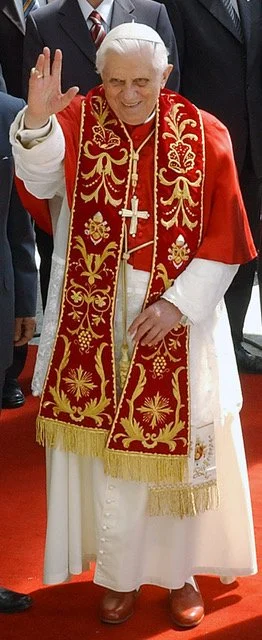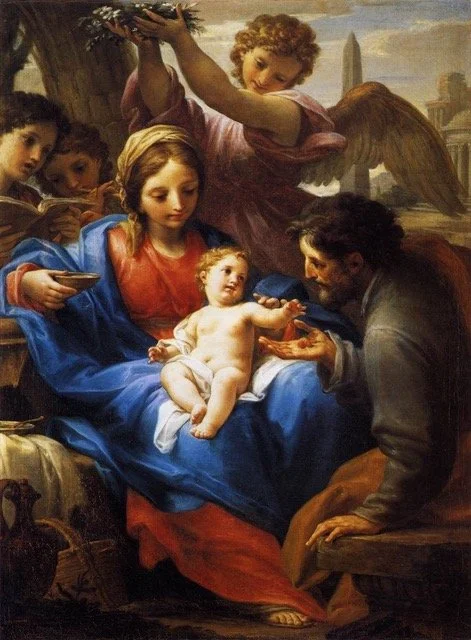Our Home in Heaven
Inspired by Pope Benedict XVI, Cormac Burke, Pope Francis, St. Josemaria
The Vocation to Marriage
Cormac Burke
CHOSEN by GOD, HOLY and BELOVED
Col. 3:12
Chosen by God to give witness to Christ and to bring all those who surround us the joy of knowing we are God’s children. CPB #30
To live out our vocation as beloved daughters and sons of Christ and become identified with Christ.
This vocation has two clear purposes: a call to faithful love and to fruitful love. CCC 2363
The first purpose is that spouses grow together in goodness, and in that openness to goodness which prepares them for HEAVEN. This means specifically that they are meant to grow in loving God (the first commandment) by means of growing in love for each other throughout their lifetime.
The second purpose is that they carry on God’s loving work of creation. In other words that as co-creators with God, they bring children into the world and rear them in the setting of family love, so as to prepare them for a life that can lead to HEAVEN.
HEAVEN
Pope Benedict XVI
In Christ ascended into heaven the human being has entered into intimacy with God in a new and unheard-of way.
Man henceforth finds room in God forever.
Heaven: this word heaven does not indicate a place above the stars, but something far more bold and sublime. It indicates Christ himself, the divine Person that completely and forever takes on humanity, he in whom God and man are united forever. And we draw near to heaven, indeed, we enter into heaven to the extent that we draw near to Jesus and enter into communion with him.
Man’s being in God, this is Heaven
Pope Benedict’s first Encyclical, Deus Caritas, God is Love
Pope Benedict’s last words, “Jesus, I love you,”
Do we seek Jesus?
The Magi asked, “Where is the newborn King of the Jews? “We saw the star at it’s rising and have come to do him homage.”
The star preceded them until it came and stopped over the place where the child was. They were overjoyed at seeing the star, and on entering the house they saw the child with Mary his mother. They prostrated themselves and did him homage.
Then they opened their treasures and offered him gifts of gold, frankincense, and myrrh. “We have come with gifts to adore the Lord.”
A Holy Day has dawned upon us. Today a great light has come upon the earth. Nations will walk by its light. The light from light who is Christ the Lord.
Seek him when your pilgrimage is ended. May you to whom they found with great joy come to him whom the Magi sought as they followed the star to the newborn King.
Epiphany. 2023
The Newborn King
This child will be the fulfillment of the promise made to King David. Behold Jesus, Son of God the Father.
His love is everlasting. He will bring unity and peace to all nations. Bishop Robert Barron
Behold the Lamb of God
Who takes away the sin of the World
John 1:29
The Holy Family
Restoring the Culture to God’s Loving Plan for the World
Pope Benedict XVI
It is not the big ideas that save the world, but the courage to tackle what is at hand, the humility that follows the voice of the heart that is the voice of God… patiently and humbly walking with Jesus step by step, joining him in loving.
People do not want from the Church what is its job to impart, the grace of being a child of God.
The transforming of evil through the power of love … Jesus bursts our NO open by means of a stronger and greater YES. In the cross of Christ and only there this saying opens up and becomes revelation. In fellowship with him, however, it becomes a possibility for our life, too.
Only the courage to rediscover and accept the divine vocation of our being can give our souls and our society a new inner stability once again.
The Yes of Jesus Christ
Pope Benedict XVI
The Crossroad Publishing Company
CHRIST THE REDEEMER
San Paulo, Brazil
May his name be blessed forever, and profound peace.
In him all the nations shall proclaim happiness.
We are encircled always by God’s saving love in Jesus Christ.
God the Father sets up “ramparts to protect us” in the arms of his Son.
Isaiah 11:40
Look to the East and see your children gathered from the rising to the setting of the sun.
Barruch 5:5
The Son of God became Man
to summon us to a
Revolution of Tenderness
Evangelii Gaudium #88, Pope Francis,
Revolution of Love, the 21st Century Home, pages 1, 2
See Vatican Conference The Theology of Tenderness of Pope Francis
Audience with the participants in the Conference on “The theology of tenderness in Pope Francis”
At 10.30 this morning, in the Clementine Hall of the Apostolic Palace, the Holy Father received in audience the participants in the Conference on “The theology of tenderness in Pope Francis”, which will take place in Assisi from 14 to 16 September 2018.
The following is the Pope’s address to those present:
Address of the Holy Father
Dear brothers and sisters,
I greet you cordially and thank Cardinal Bassetti for the kind words he has addressed to me in your name, and also for your works, in which he updated me on the work you do. You have reflected in recent days on the theology of tenderness, and I wish simply to say something to you, because when I saw that this was the title, I began to study. You have made me read this book to understand what the “thing” was. A good book, you know it, the one by Rocchetta. He is good… is it him? [Applause].
I would like, simply, to propose three ideas.
The first concerns the expression “theology of tenderness”. Theology and tenderness seem to be two distant words: the first seems to recall the academic context, the second interpersonal relations. In reality our faith links them inextricably. Theology, in fact, can not be abstract – if it were abstract, it would be ideology – as it arises from an existential knowledge, born from the encounter with the Word made flesh! Theology is then called to communicate the concreteness of God’s love. And tenderness is a “concrete existential” asset, to translate in our times the affection that the Lord nourishes for us.
Today, in fact, there is less focus on the concept or practice and more on “feeling” than in the past. We may like it or not, but it is a fact: we start from what we feel. Theology can certainly not be reduced to sentiment, but neither can it ignore that in many parts of the world the approach to vital issues no longer begins with the ultimate questions or social demands, but with what the person feels emotionally. Theology is called upon to accompany this existential quest, bringing the light that comes from the Word of God. And a good theology of tenderness can present divine charity in this sense. It is possible, because the love of God is not an abstract general principle, but personal and concrete, that the Holy Spirit communicates intimately. Indeed, He reaches and transforms the feelings and thoughts of man. What content could a theology of tenderness therefore have? Two seem important to me, and they are the other two ideas that I would like to offer you: the beauty of feeling that one is loved by God, and the beauty of feeling loved in the name of God.
Feeling we are loved. It is a message that has come to us more strongly in recent times: from the Sacred Heart, from Merciful Jesus, from mercy as an essential property of the Trinity and of Christian life. Today the liturgy reminds us of Jesus’ word: “Be merciful, just as your Father is” (Lk 6: 36). Tenderness can indicate precisely our way of receiving divine mercy today. Tenderness reveals us, next to the paternal face, the maternal face of God, of a God Who loves mankind, Who loves us with a love infinitely greater than that which a mother has for her own son (cf. Is 49: 15). Whatever happens, whatever we do, we are certain that God is near, compassionate, ready to be moved for us. Tenderness is a beneficial word, it is the antidote to fear with regard to God, because “there is no fear in love” (1 Jn 4:18), because trust overcomes fear. To feel loved, therefore, means learning to trust in God, to tell Him, as He wishes: “Jesus, I trust in You”.
These and other considerations can deepen research: to give the Church a “flavourful” theology; to help us live a conscious faith, burning with love and hope; to exhort us to kneel, touched and wounded by divine love. In this sense, tenderness refers to the Passion. The Cross is in fact the seal of divine tenderness, which is drawn from the wounds of the Lord. His visible wounds are the windows that open onto His invisible love. His Passion invites us to transform our heart of stone into a heart of flesh, to become passionate about God. And about man, for the love of God.
Here then is the last idea: feeling we are able to love. When man feels truly loved, he feels inclined to love. Besides, if God is infinite tenderness, then man too, created in His image, is capable of tenderness. Tenderness, then, far from being reduced to sentimentalism, is the first step to overcome the withdrawal into oneself, to leave behind the self-centredness that disfigures human freedom. God’s tenderness leads us to understand that love is the meaning of life. Thus we understand that the root of our freedom is never self-referential. And we feel called to pour into the world the love received from the Lord, to channel it into the Church, in the family, in society, to interpret it in serving and giving ourselves. All this not out of duty, but out of love, out of love for Him, by Whom we are tenderly loved.
These brief ideas point towards a theology on the move: a theology that emerges from the narrow alleys to which it is sometimes confined, and that with dynamism turns to God, taking man by the hand; a non-narcissistic theology, but aimed at the service of the community; a theology that is not content to repeat the paradigms of the past, but that is the Word incarnate. Certainly the Word of God does not change (cf. Heb 1: 1-2, 13,8), but the flesh that it is called to assume, this yes, it changes in every age. There is so much work, therefore, for theology and for its mission today: to incarnate the Word of God for the Church and for mankind in the third millennium. Today more than ever we need a revolution of tenderness. This will save us.
Let us entrust the advancement of your work to Our Lady, Mother of tenderness. I bless you and, together with you, I bless the communities you come from; and I ask you to pray and have others pray for me. Thank you.





